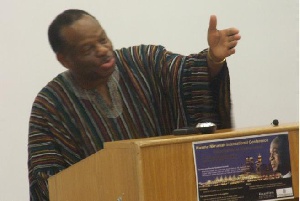Richmond, BC, Canada -- For the first time in Canada, an international conference on the legendary Ghanaian leader Osagyefo (the Redeemer) Dr. Kwame Nkrumah was held at the Richmond campus of British Columbia's Kwantlen University August 19-21.
The conference attracted 150 participants and over 30 scholars from Africa, Australia, the U.S.A., the U.K. the Caribbean, and Canada. Presenters and attendees were deeply engaged as they exchanged stimulating ideas and shared lively discussions about the philosophies and ideals of Kwame Nkrumah and the state of Africa.
The conference celebrated the centennial of Nkrumah’s birthday as international panelists gathered to discuss his impact on African and world politics, pan-Africanism, colonialism and post-colonialism, globalization, and the African Diaspora. Keynote addresses were given by Dr. Molefi K. Asante, one of the world’s most published contemporary experts on African-American history and culture, Dr. Gillian Creese, professor of sociology at University of British Columbia and researcher of immigration and settlement in Canada, and a number of other respected scholars who revisited and discussed Nkrumah’s outstanding accomplishments.
Reflecting on the success of the conference, event organizer and Kwantlen sociology faculty member Dr. Charles Quist-Adade remarked, “For three days, Kwantlen was treated to an intellectually stimulating exchange of ideas by scholars from diverse disciplines and from different parts of the world. Many of the delegates paid glowing tribute to Kwantlen for hosting the conference and are eagerly awaiting the second Kwame Nkrumah International Conference.”
Kwantlen students Nasim Mosallaei and Sheila Wong who helped with the coordination of the conference felt inspired and enlightened after participating in the event.
Mosallaei commented, “I felt privileged to be able to listen to some of the many discussions regarding the legacy of [Dr.]. Nkrumah and the current state of the continent of Africa. In the end I met a lot of influential people with a lot of ideas on Africa and I walked away from the conference having learned a great deal more about Kwame Nkrumah.”
Wong added, “I was touched by everyone’s genuine concern for Africa’s conditions and their interest in the continuation of Nkrumah’s philosophies and ideals. No doubt, the Kwame Nkrumah International Conference has inspired many new ideas, thoughts, and renewed hope for everyone involved.”
Nkrumah led Ghana to independence on March 6, 1957 after more than a century of British colonial rule, the first in independence in sub-Saharan Africa. He is regarded as one of Africa’s greatest statesmen. BBC listeners in Africa voted him Africa’s Man of the Millennium in1999, and in 1978 the United Nations awarded Nkrumah a posthumous gold medal during a session of the UN committee against the racist regime in South Africa.
As should be expected, the conference attracted world class Pan-Africanist scholars like Professsor Molefi Kete Asante of Temple University in the United States, Dr. Hakim Adi of Middlesex University, Dr. Atukwei Okai, Dr. Kofi Anyidoho, both of the University of Ghana, Dr. Afua Cooper of the University of Toronto and many others.
In his keynote address Asante announced that at least 17 African countries have agreed to constitute themselves into the United States of Africa with more expected to join soon. A United States of Africa was one of President Nkrumah's pet projects in Ghana before he was overthrown in a Central Intelligence of America (CIA) sponsored coup led by a combination of Ghanaian military and police officers while he was on a visit to Vietnam in 1966.
Molefi Asante, the formemost living proponent of the the academic discipline of Africology revealed that various committees in several African countries are currently working on mechanisms to create a continental government within the shortest possible time. Speaking on the topic Prospects for World in Nkrumah's Unity Projects, Asante noted that the Ghanaian leader's vision was all-encompassing with the central tenet being the establishment and promotion of the "African Personality," free from neo-colonial and other entanglements.
In his welcome address, one of the organizers of the conference, Dr. Charles Quist-Adade noted the just ended conference " will probably" be the last event in the year-long series of activities around the world to commemorate the centenary anniversary of the birth of Dr. Kwame Nkrumah, "Africa’s Man of the Millennium and perhaps the most famous pan-Africanist after Marcus Garvey and W. E. B. Du Bois."
Quist-Adade said it was noteworthy that the conference was being held at the confluence of the anniversaries of several monumental events in Africa, the most important of which is the fiftieth anniversary of what is popularly referred to as “The Year of Africa.”
"The year 1960 witnessed a host of events, including the end of the Mau Mau resistance in Kenya, mass riots during Charles de Gaulle’s trip to Algeria, the murder of sixty-nine non-violent protestors in South Africa’s Sharpeville Massacre, and independence for seventeen African nations," he said.
He added that while the year was marked by both the entrenched brutality of European colonial rule and the birth of new African nations, there was an overwhelming sense of optimism for a vibrant, independent, and self-sufficient Africa.
The Kwanten University professor revealed that conference also coincided with the twentieth anniversary of the release of Nelson Mandela from jail, which signaled the demise of the apartheid system in South Africa.
As well, he pointed out, "this conference coincides with the 125th anniversary of the Berlin Conference, which partitioned Africa among the European imperial powers. Finally, this conference coincides with yet another important milestone in the annals of Africa’s liberation movement, the sixty-fifth anniversary of the fifth Pan-African Congress held in Manchester, of which Nkrumah was organizing secretary."
He further noted that the Kwame Nkrumah International Conference ( KNIC) was also being held at a time when Africa’s continental body, the African Union (AU), had accepted and is working on Nkrumah’s blueprint for a continental union government. "As one of the founders of the predecessor continental body, the Organization of African Unity, Nkrumah had single-mindedly and stoutly campaigned for a continental union government of Africa to pool its vast natural and human resources for the benefit of the continent’s peoples, " he said.
Quist-Adade said in July 2009, the AU issued a “Declaration on the Celebration of the 100th Birthday Anniversary of Kwame Nkrumah,” praising him as “an advocate of pan-Africanism who played a vital role in the establishment of our Continental Organization and the liberation of the Continent.”
"But as the AU progresses towards Nkrumah’s vision of a United States of Africa, an intense debate rages in both academia and the political sphere as to whether Africa is ready for a continental union government. The debate also revolves around which is the best route to a continental government: a gradual, piecemeal route through regional economic unions, or a radical and immediate political and economic union, as proposed by Nkrumah, " he pointed out.
Asante however was very optimistic. He proudly announced that there will be a United States of Africa by the year 2017 if everything goes as planned.
General News of Monday, 30 August 2010
Source: Gibril Koroma with additional reporting from James Chang













